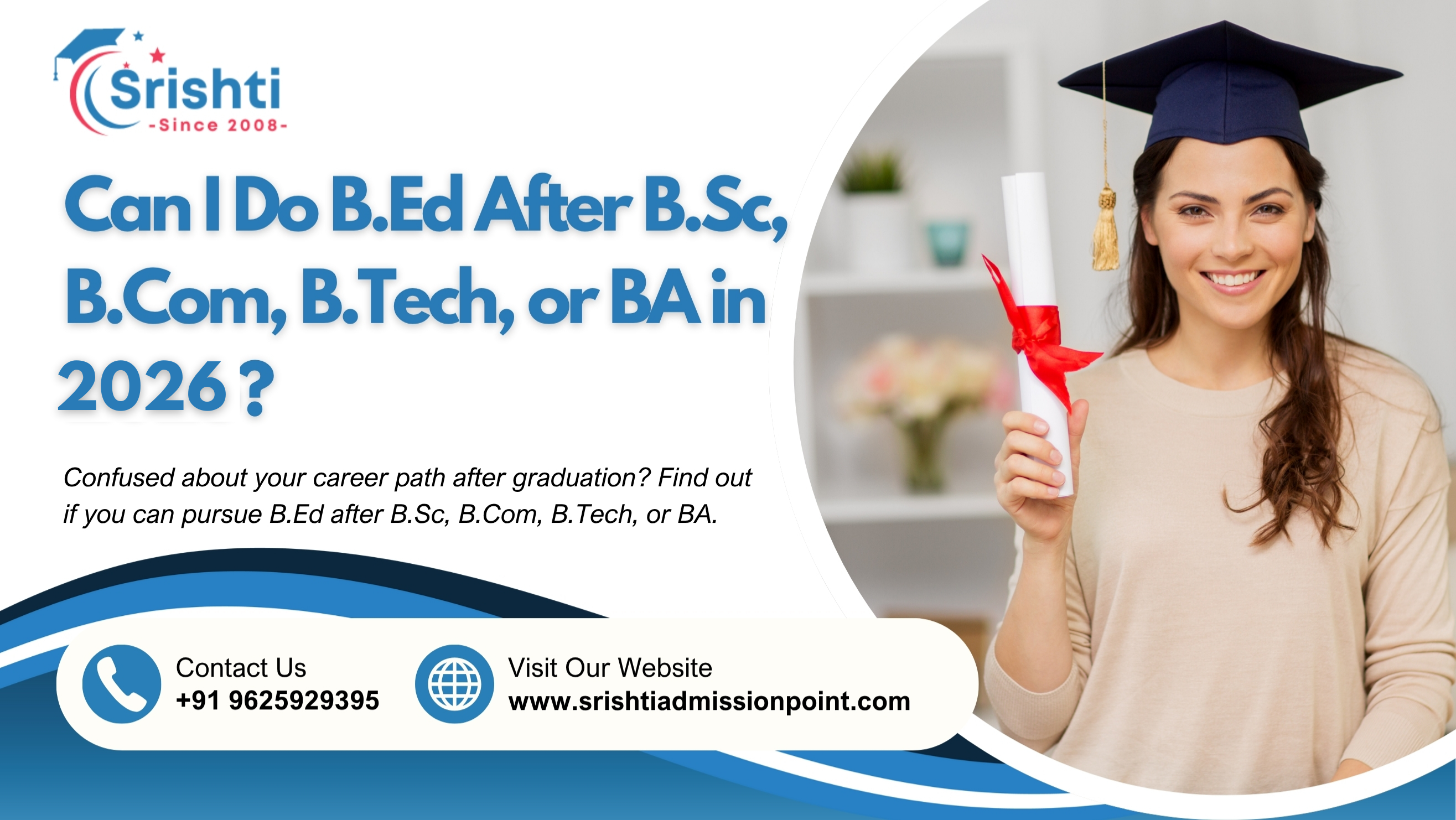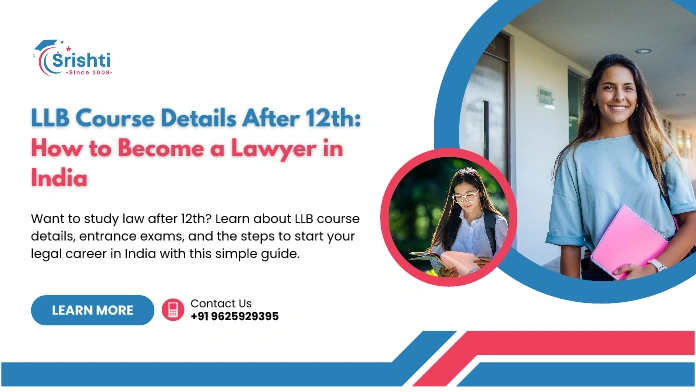
Choosing to pursue a B.Ed (Bachelor of Education) after completing graduation is a common and wise decision for those who want to enter the teaching profession. In 2026, more students than ever are asking whether they can enroll in a B.Ed program after completing degrees like B.Sc, B.Com, B.Tech, or BA.
The good news is that you absolutely can—a B.Ed. The B.Ed course is specifically designed for graduates who want to become certified teachers in schools, whether private or government-run.
In this blog, we will clearly explain whether you are eligible for B.Ed after graduation and how different degrees, such as B.Com or B. Tech is addressed in the admission process, including career options you can expect after completing the course, and how to plan your journey to become a teacher in 2026.
Understanding B.Ed Eligibility 2026
As per current norms and university guidelines, the minimum requirement to apply for a B.Ed course is a graduation degree in any stream from a recognized university. Whether you have completed B.Com (Commerce), B.Sc (Science), B.Tech (Engineering), or BA (Arts), you are eligible to apply for B.Ed in 2026.
You should have at least 50% marks in your undergraduate degree. For reserved category students (SC/ST/OBC), relaxation in marks is usually provided, depending on the university or state policy. The course is offered in both regular and distance/online modes, depending on your availability and goals.
It's also important to check if the B.Ed college is recognized by the National Council for Teacher Education (NCTE), as this recognition is required for your degree to be valid for teaching jobs.
Can I Do B.Ed After B.Com?
Yes, students who have completed their Bachelor of Commerce can easily pursue B.Ed. Many candidates from a commerce background choose this path to become teachers in subjects like Business Studies, Accountancy, or Economics at the higher secondary level.
If you have a B.Com degree and are interested in teaching or planning to appear in CTET, TET, or state-level teacher recruitment exams, then pursuing B.Ed after B.Com will be an option for you. You can also opt for subject specialization based on your undergraduate background. Commerce graduates are especially in demand in schools that offer commerce streams.
B.Ed After B.Sc: What You Should Know
Science graduates who have completed their B.Sc. in subjects like Physics, Chemistry, Biology, or Mathematics often pursue a B.Ed. to become science or math teachers in secondary and senior secondary schools. This combination is highly valued in both CBSE and state board schools.
Students with a science background can choose subjects for pedagogy that align with their undergraduate discipline. Many schools require science-trained teachers who can teach with clarity and strong subject knowledge, making B.Sc + B.Ed a powerful combination for a stable teaching career.
Is B.Ed. Possible After B.Tech?
A common question among engineering graduates is whether they are eligible for B.Ed. The answer is yes. B.Tech holders can pursue B.Ed, especially if they want to switch to a more stable or fulfilling career in education.
Engineering graduates with a specialization in subjects such as computer science, electronics, or mathematics can opt to teach IT or mathematics in secondary schools. Several states and universities allow B.Tech students to apply for B.Ed., though the preferred teaching subjects may depend on your engineering stream.
With the rise of technology-based education, teachers with technical backgrounds are now in demand in smart classrooms and online learning platforms.
B.Ed After BA: A Natural Progression
Arts graduates are among the largest group of applicants for B.Ed programs in India. Whether you studied subjects like English, History, Political Science, Geography, or Hindi, you can pursue B.Ed and become eligible to teach in middle, secondary, or senior secondary schools.
B.Ed after BA is a natural path for those aiming to become teachers in government schools or seeking to clear exams such as CTET, UPTET, REET, or DSSSB. With a BA degree and a B.Ed qualification, you can teach subjects related to humanities and languages, which are essential at all school levels.
Which Subjects Can You Teach After B.Ed?
Your ability to teach a subject after B.Ed depends on the subjects you studied during your graduation. Most universities offer B.Ed. You are required to choose two teaching subjects that align with your previous education.
For example:
- B.Sc graduates may teach Physics, Chemistry, Biology, or Mathematics.
- B.Com graduates can be educated in Economics, Business Studies, or Commerce.
- BA graduates can teach Geography, History, Civics, or English.
- B.Tech students can be eligible to teach Mathematics or Computer Science.
Choosing the right pedagogy subjects during your B.Ed is essential for matching with your future teaching roles.
B.Ed Course Duration, Mode & Fees
The B.Ed course typically lasts for 2 years, whether you study it in regular, distance, or online mode. Some universities offer semester-based formats, while others follow an annual examination schedule.
For professionals and those who cannot attend daily classes, there are distance learning and online B.Ed courses offered by UGC- and NCTE-approved universities. These are flexible in terms of learning without compromising the validity of the degree.
Fee structures vary widely:
- Regular B.Ed colleges (government): ₹20,000 to ₹70,000 per year
- Private B.Ed colleges: ₹50,000 to ₹1,50,000 per year
- Distance/online B.Ed: ₹30,000 to ₹70,000 per year (entire course)
You can also find scholarships and fee waivers depending on category, income, or merit criteria set by colleges.
What's the Admission Process in 2026?
B.Ed admission in 2026 is conducted through entrance exams in most states and universities. Popular exams include:
- UP B.Ed JEE (for Uttar Pradesh)
- Bihar B.Ed CET
- MAH B.Ed CET (for Maharashtra)
- DU B.Ed Entrance (Delhi University)
- Rajasthan PTET
However, some private and distance-learning institutions offer direct admission without any entrance test. This is an excellent option for students who prefer flexibility or are already working.
If you're looking for flexible admission options, keep an eye on B.Ed Admission 2026 announcements by both government and private universities. Ensure you verify the university's recognition status before submitting your application.
Career Options After Completing B.Ed
Once you complete your B.Ed., a variety of career paths open up. The most common and stable option is to become a teacher in government or private schools. You can apply for government school jobs by qualifying for the TET (Teacher Eligibility Test) or CTET (Central Teacher Eligibility Test). Some states also conduct their teacher recruitment exams.
You may also work as:
- Primary or secondary school teacher
- Private tutor or academic mentor
- Online educator or content creator
- Curriculum developer
- Education counselor
- Special education teacher (with additional diploma)
If you're interested in higher studies, you can pursue M.Ed (Master of Education) or even apply for NET/JRF if you wish to go into academics and research.
Conclusion
Whether you hold a B.Com, B.Sc, B.Tech, or BA degree, and aspire to become a teacher, pursuing a B.Ed in 2026 is a viable option and a great career choice. The eligibility criteria are simple, and the course prepares you not only academically but also professionally for the classroom environment.
The demand for trained and qualified teachers in India is steadily increasing, particularly with the expansion of digital and skills-based education. Opting to pursue B.Ed after graduation adds a solid professional qualification to your resume and opens doors to opportunities in the public, private, and even online education sectors.
Recent Post








